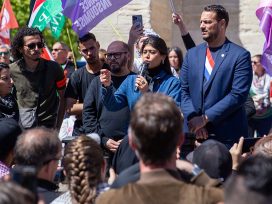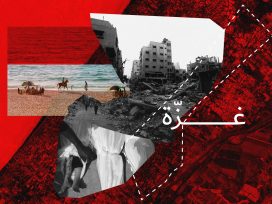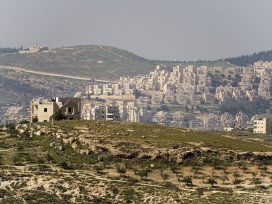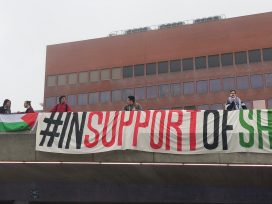“The peace of the brave is within our reach”, said Bill Clinton one sunny day in the Rose Garden outside the White House in Washington. It was 13 September 1993, and he continued: “It charts a course toward reconciliation between two peoples who have both known the bitterness of exile. Now both pledge to put old sorrows and antagonisms behind them and to work for a shared future […] tomorrow belongs to them.” Three thousand peace supporters had come together to witness the ceremony, including two former Presidents, Jimmy Carter and George H.W. Bush. Norway was represented by foreign minister Johan Jørgen Holst; the Norwegian couple Mona Juul and Terje Rød-Larsen were also anonymous members of the audience. Proceeding under a shroud of secrecy, these two Norwegian diplomats had brokered a deal between two political antagonists now positioned on either side of Clinton: Israeli Prime Minister Yitzhak Rabin and PLO leader Yasser Arafat, representatives of countries that claimed one and the same capital city as their own – namely, Jerusalem. Working together for the first time, it had become clear to both that the time had finally come, after centuries of rule by different foreign powers – Ottoman, British, Jordanian and now Israeli – to give the Palestinians their own state.
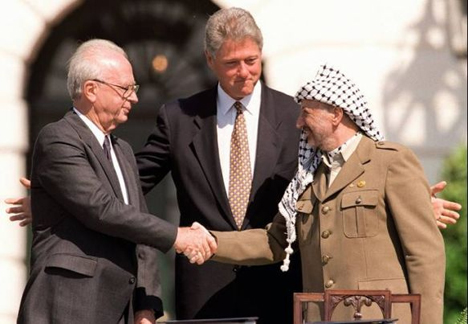
Prime Minister Yitzhak Rabin with President Clinton and Yasser Arafat during the signing of the Oslo I Accord in 1993. Photo: Israel Defense Forces. Source:Flickr
“We, the soldiers who have returned from battle stained with blood”, said Rabin, who was no stranger to the art of war, “we who have fought against you, the Palestinians. We say to you today in a loud and clear voice: ‘Enough of blood and tears! Enough!'” More applause. Nevertheless, Rabin did hesitate for a split second when Clinton, who seemed to relish the role of emotional bridge builder between Rabin and Arafat, gestured to the two to exchange handshakes. Arafat put out his hand first: an audible gasp of relief rose from the audience as the two hands met.
It was a historic moment, the first face-to-face agreement between the Palestinian and Israeli governments, and the first time the two recognized the other’s right to exist. The so-called Oslo Accords, hammered out in secret at the Fafo Research Foundation in Oslo, marked the official end of a century of enmity between Palestinians and Jews in the Middle East.
The formal signing of the Oslo Accords took place at the very same wooden table at which Israel and Egypt had signed the Camp David Peace Treaty in 1979 – an agreement that ultimately cost president Anwar Sadat his life in 1981, but also won him the Nobel Peace Prize in the interim and, more importantly, secured Egypt 2.3 billion US dollars for each year that it complied with the terms of the treaty.
But apart from the table, the peace prizes and the political assassinations that followed in their wake, the Camp David and Oslo agreements were fundamentally different. The Oslo agreement was never meant to be a permanent peace treaty, but a peace process – an interim agreement to be polished and nailed down over the next five years.
Israel riven by internal divisions
Naturally, not everyone shared this sense of optimism. Detractors of Rabin and Arafat’s handshake included ultra-nationalist Jews. Ever since Israel’s seizure of the West Bank in the 1967 Six-Day War, they had been fantasizing about a “Greater Israel”, a Jewish state stretching from the Mediterranean to the Jordan River. When the nationalist Likud Party came to power in 1977, their dream had received the government’s blessing in the form of its settlement policy; the ascendance of the Israeli Labour Party in the 1992 elections, however, dealt their dream a serious blow. From the ensuing talks between the PLO and the Labour Party, plans emerged for the future establishment of a Palestinian state in the occupied territories.
The fragile peace process entered a crisis phase in 1995, when an ultranationalist Israeli fired three shots at Rabin as the Prime Minister was making his way home after a demonstration in Tel Aviv in support of the Oslo Accords. The year before, he had received the Nobel Peace Prize along with Arafat and Israel’s Foreign Minister, Shimon Peres – but in practice, peace was far from being achieved.
From the Palestinian point of view, the Oslo Accords had one critical defect: they didn’t limit Jewish settlement activity in Palestinian areas. Israel’s expropriation of land to build new settlements was not in violation of the signed documents. To many Palestinians – if not all –, the deal was nothing but a trap into which Arafat had fallen. Determining the final borders, the question of “indivisible” Jerusalem, security, access to water, Jewish settlers and Palestinian refugees awaiting the right to return: dealing with all these issues had been postponed until the end of the five-year “trial period”.
Lasting peace treaty unrealistic
No head of state in the world would envy Arafat and his semi-kingdom. The territories of the Gaza Strip and an enclave of Jericho in the West Bank over which he had limited control – land that had once “flowed with milk and honey” – had long since lost their biblical glory. Above all, the people were gripped by a sense of powerlessness in the face of the Israeli army (IDF), which, promises notwithstanding, had not pulled its troops out of the territories. Were Israel to dismantle its “security arrangements”, new settlers would become an obvious target for Palestinian militants.
“It would have been unrealistic to draft the Oslo Accords as a permanent peace treaty”, explains Mona Juul, who in the middle of the summer break agreed to meet me at the Litteraturhuset (House of Literature) in Oslo. “The agreement has to be interpreted in the light of its historical context.” And the historical context is something the director general at the Ministry of Foreign Affairs remembers better than most. Together with Terje Rød-Larsen, she was a key figure in the clandestine negotiations that led to the Oslo Accords in 1993.
“The talks took place in the middle of the First Intifada”, Juul explains. “The Americans had no contact with the PLO, and didn’t want to know when they were briefed during the talks. The PLO wasn’t recognized as a political organization, and Israel had imposed heavy penalties on contact with ‘terrorist organizations’. So, to think that the first real negotiations between Israel and PLO could solve all the difficult issues would have been unrealistic.
All the same, some of the criticism levelled at the Oslo Accords has been justified, Juul concedes. “The plan was to build an atmosphere of trust between the parties over a five-year period, after which they would be ready to tackle the big questions. Well, that’s not how it turned out.”
She remembers in detail how it all began. Her own interest in the Middle East was kindled when she worked as a diplomat in Cairo in the late 1980s. Her husband, Terje Rød-Larsen, had taken time off from his job as head of the Fafo Research Foundation so as to be with his wife. In Cairo, he got to know Fati Arafat, Yasser Arafat’s brother, then head of the Palestinian hospital in the city. In the Egyptian capital, the two agreed to organize a survey of Palestinians’ living conditions, to be conducted by Fafo, and it was during this survey that Rød-Larsen established important connections with people on both the Israeli and the Palestinian side.
“When the Madrid Conference ground to a halt in 1991, the PLO approached Norway’s then Foreign Minister, Thorvald Stoltenberg, to ask if they could set up a back channel to enable working relations with Israel”, Juul recalls. “Norway was a natural choice for the PLO chiefly because we were neutral. We were palatable as far as Israel was concerned, and in contrast to the United States, we recognized the PLO.”
The first talks took place in a conference room in Sarpsborg in January 1993. The PLO had dispatched an official delegation, but Israel only fielded a couple of academics. Either Israel’s foreign minister would have to attend, demanded the PLO, or the country would have to send an official delegation before they would consider proceeding with any talks. It fell to the Norwegian couple to entice a permanent secretary from the Israeli foreign ministry to Norway.
One episode in particular stands out in Juul’s memory from the end of the protracted process, which as far as the outside world was concerned was just a series of academic conferences. After eight months of furtive negotiations, a final agreement appeared to be within reach. But when Uri Savir, the Israeli diplomat, and Ahmed Qurei (better known under his nom de guerre Abu Alaa), the PLO’s financial adviser, came out of the negotiating room, their facial expressions were grim. “Unfortunately”, they said, “we have been unable to agree. There will be no deal”.
In fact, the two arch-enemies had enjoyed themselves no end in cooking up a gag to fool Juul into to thinking all was lost. They both had the same sense of humour. It came as a great relief to Juul when the final agreement was ready to sign at a secret ceremony in Parkveien in Oslo on 20 August, and officially in Washington less than a month later.
“It was a very emotional ceremony”, she remembers. Since then, the agreement she helped bring into being has been dubbed an international fiasco. What does she think about the agreement today, twenty years later?
“We still don’t have a two-state solution, unfortunately, but the other options aren’t particularly attractive either, neither to the Israelis nor the Palestinians. Demographically, the Palestinian population is growing; and since Israel is determined to keep a Jewish state, a single-state solution is just not feasible.”
Having said that, the Oslo agreement did play a decisive role in the development of a two-state solution, Juul believes: “The Palestinian National Authority, which was a product of the Oslo agreement, is still alive. Even if they don’t have a capital or borders, it remains in many ways a functioning state with a government, schools, hospitals and welfare schemes. What’s more, material living standards in Gaza and the West Bank are much better than they were 20 years ago. In my opinion, all that is down to the Oslo agreement.”
Spinning Norway as a neutral party
On the fifth floor of the Niels Treschow building at the University of Oslo, a different view prevails. “Norway meant well and believed in its gradualist approach to peace. They believed Israel and Palestine would eventually become two states. But all this talk about a two-state solution is an illusion”, says Hilde Henriksen Waage, professor of Middle Eastern Studies.
Ever since her thesis “When the State of Israel Came into Being” (Da staten Israel ble til) was classified by the Foreign Ministry in 1989 (it was later published by Gyldendal), Waage has devoted her professional life to the study of the Middle East in general and the Oslo Accords in particular, despite the fact that the response to her doctoral thesis “Norway: Israel’s best friend” (1996, Norge: Israels beste venn) and two research reports: Norwegians? Who needs Norwegians? (2000) and Peace Making is a Risky Business (2004) caused her to dream of applying for political asylum in Sweden. Her conclusion is and remains the same: the official spin of Norway as a neutral party in the creation of the Oslo Accords has a non-official side as well.
It all began when the Foreign Ministry gave Waage access to its secret archives (“an action they no doubt came to regret”), to look for answers to the question as to how Norway became a peace broker in the Middle East. “There was the revolution in Iran in 1979”, explains Waage. “Iran furnished Israel with most of its oil, and the country now needed to find a new main source. And who had just discovered oil in the North Sea? Yep, that was Norway. The United States, Norway’s close ally, asked the Norwegian government to consider whether Norway couldn’t become Israel’s chief supplier.”
This put the cat among the pigeons in Norway; it was only a year since Norway had deployed troops to serve in the United Nations Interim Force in Lebanon (UNIFIL), says Waage: “It ended with Foreign Minister Knut Frydenlund sending a diplomat, Hans Wilhelm Longva, down to Yasser Arafat in Beirut to sound out the opinions of the PLO leader about the secret request. Arafat’s position – it’s okay with me, Israel will get its oil anyway – was surprisingly generous. Arafat, though, wanted something in return.”
What Waage is referring to here is that ever since the 1979 Iranian revolution, Arafat had been urging Norway, which in turn urged Israel, to establish a secret back channel for talks.
“Although Terje Rød-Larsen was a firm believer in his own dexterity, he didn’t just appear out of the blue”, says Waage. “There was nothing wrong in theory with the Declaration of Principles formulated in 1993, but the prevailing balance of power was far too asymmetrical to make any real difference either way. One of the parties was powerful (Israel), the other was powerless and occupied (the Palestinians), and in the middle was Norway, a weak mediator. The parameters favoured by the strongest party dictated the deal; Israel offered nothing more than they were prepared to let go of at any given time. Of course, they were not interested in giving the Palestinians more than crumbs, and Norway was unable to persuade Israel to give more.”
Waage is even less optimistic today than she was twenty years ago: “There is no land left for what is supposed to be a contiguous Palestinian state. Not to mention the fact that the areas are densely populated with Jewish settlers, and split into fragments by roads, military installations and infrastructure. A contiguous Palestinian state is simply out of the question because there is no land left to put it on”, says Waage.
Nevertheless, she understands why it might be difficult to abandon hopes for a two-state solution. Today, Palestinians are the biggest receivers of financial support, primarily through the European donor group Ad Hoc Liaison Committee (AHLC), an initiative of Norway undertaken after the Oslo Accords were signed. It is chaired by Norway, and receives support from the European Union and the United States. Unfortunately, assistance can only be provided as long as it is assumed that a Palestinian state will emerge at some point in the future.
“Both sides have an interest in pretending to negotiate”, says Waage. “The Palestinians rely on the survival of the vision of a two-state solution because of the Liaison Committee, because the day the two-state solution is declared null and void, the flow of assistance will dry up. And Israel is concerned to strengthen its international standing, since the majority of the UN wants a Palestinian state.”
Destructive aid
“Superficially, it might look as if the Palestinians have a state of their own, but this façade has nothing to do with reality”, a disillusioned Palestinian professor informs us on the phone from Ramallah.
For the past twenty years Nader Said has headed the research group AWRAD and specialized in polling opinions of young Palestinians. He is currently writing a book about the Oslo agreement and everything that went wrong afterwards.
“We have neither the substance nor the required accoutrements to define an autonomous state. Internationally, there seems to be a theory that the financial assistance contributes to state-building, but the opposite is true. The public sector has grown to rely on foreign aid, and the private sector has become dependent on loans, but the money doesn’t come without strings. Aid has made us vulnerable.” The shortcomings of the Oslo agreement, Said believes, followed by the crippling cash flow from the AHLC, have helped normalize the occupation.
“You can´t buy peace with money. On the contrary, reliance on aid creates a sense of not having control of your own destiny, of powerlessness. Our destiny is controlled not by ourselves, but by international moods, political volatility and whoever happens to sit in the Knesset. The situation has made it impossible to make demands or initiate a policy of more direct confrontation with Israel.”
In Said’s opinion, the recent shuttle diplomacy of the US Secretary of State is a “hoax”, because peace talks prop up the illusion that the Palestinian Authority is autonomous and independent. There is only one way to truly move towards a two-state solution, Said suggests. The international community must hold Israel responsible for the occupation.
“I remember the day the Oslo agreement was signed. Hundreds of thousands took to the streets to celebrate the auspicious event. There was optimism everywhere. Opinion polls showed 65 per cent in support of the peace process, only 28 per cent against. Today, support for the peace talks is down to 45 per cent, and those who support the talks today, do so in the absence of palpable alternatives. Most Palestinians are disillusioned. There aren’t many who haven’t seen through the peace negotiations; they’re just another word for ‘business as usual’.”
Said laments the building of new settlements, which is illegal under international law, but can only protest that it violates “the spirit” in the Oslo Accords. In 1989, there were 199,900 Jewish settlers in the West Bank. Today, 350,000 Jews live in the same area, in addition to the 250,000 in the annexed eastern part of Jerusalem. And more and more settlers, for whom the dream of a “greater Israel” lives on, are settling down in the Palestinian areas.
However, when you look at it, it’s hard not to recognize Zionism’s victory and the Palestinians’ total defeat. Israel has won the race for Jerusalem, and Netanyahu, who hopes the peace agreement will go away by itself, has been handed a dream partner in Hamas, which, like the Likud Party, considers the other side as a temporary phenomenon. Hamas has – unfortunately, according to Said – taken control of Gaza, and their repeated suicide and rocket attacks have given Netanyahu a good pretext to stir up the most paranoid, nationalistic sentiments in his people.
Said has no reason to be optimistic. But as Winston Churchill once said, jaw-jaw is after all better than war-war.
